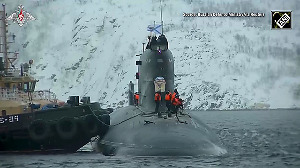During 1997-2001, the US Patent and Trademark Office (USPTO) granted almost half a million patents and over 700 organisations were granted more than 100 patents each during these five years.
Overall, more than 3,53,000 utility, plant and reissue applications were filed in 2004 alone and out of these, foreign applicants filed more than 1,59,000.
Evalueserve estimates that as many as 5,00,000 patent applications will be filed with the USPTO in 2010.
Within the US, the task of preparing, filing and prosecuting patent applications as well as that of performing other intellectual property work (preparing, filing and prosecuting trademark applications and copyrights, intellectual property or IP litigation and IP asset management) is being performed by approximately 30,000 attorneys and agents who are registered with the USPTO.
In order to meet the rising demand for the additional IP work, Evalueserve predicts that this number will exceed 38,000 by 2010; otherwise, the corresponding prices will rise very sharply.
Currently, many large organisations have in-house IP divisions that usually consist of agents, associates, lawyers and business development professionals who handle pretty much all kind of IP work.
However, most small and medium-sized enterprises do not have such divisions, and even many large firms often outsource some -- or all -- of their IP work to external, US-based law-firms.
To contain costs, many in-house IP divisions as well as stand-alone IP law firms have already started outsourcing some of their work (that is, drafting of figures, literature searches, prior art searches, and invalidation studies) to third parties within the US and some even to other countries.
But since the corresponding budgets (for IP creation and maintenance) are likely to grow only at the rate of inflation, companies are beginning to look for cost savings without jeopardising quality in any significant way.
Further, since a lot of research and development will be done in emerging countries such as India and China, many companiesare beginning to explore the potential of offshoring IP services to third parties, particularly those that are located in low-wage countries such as India.
We estimate there were approximately 280 IP professionals in India in December 2004 who were providing various kinds of patent-related services to US end-clients, including literature searches and prior art searches, technology and patentability assessment, patent claim mapping, and so on.
We predict that this number is likely to grow six-fold by the end of the decade.
Various models seem to be emerging to deliver such services. These include captive centres set up by US law firms and their subsidiaries.
Currently, Indian law does not allow foreign law firms to practice in India. Hence, some law firms in the US and India are setting up subsidiaries so that they do not practice law in India but provide such IP services only for export purposes.
For example, Schwegman, Lundberg Woessner and Kluth -- a law firm that is headquartered in Minneapolis -- has set up two captive centres for one of its subsidiary, Intellevate, that are located in Delhi-Gurgaon and Bangalore.
Intellevate currently has over 80 professionals in India that are involved in prior art searching and patent proof reading and soon they will be providing most -- if not all -- of the services mentioned earlier.
Another example of this is Nishith Desai and Associates, an Indian law firm with offices in Mumbai, Bangalore and Palo Alto, whose subsidiary IPPRO has over 10 professionals located in Mumbai.
And, yet a third example is Patent Metrix, an Irvine-California-based law firm, which has an Indian subsidiary with 15 to 20 professionals in India.
Another good example is General Electric that has more than 60 IP professionals (within its GE Research and Development centre in Bangalore) and these professionals seem to be involved in most, if not all, of the services listed.
In other cases, a few US-based law firms have started joint ventures with their counterpart law firms in India. A good example is Cantor Colburn, Esq that has joined hands with Lall and Sethi, Esq in India.
However, since most joint ventures generally fail -- especially in India -- one needs be cautious while treading this path. In addition, there are third party vendors that provide such services to law firms.
Apart from this, there are also various service models. In one case, the invention disclosure is directly sent to an offshore IP services' company, say in India.
This company assigns one or more IP professionals who work in close coordination with the inventor(s) to appropriately draft the complete specifications and claims and prepare all drawings.
The "final" draft of the patent application is then reviewed, modified and filed by the client's US patent attorney or by a US patent attorney contracted by the Indian IP services' company. In this model, the US attorney typically spends eight to 10 hours.
Alternate models require the US patent attorney draft the claims whereas the offshore IP services' company draft the background, provide the supporting specifications, draft the summary and abstract, and prepare the figures.
Again, the "final" draft of the patent application is reviewed, modified and filed by an appropriate US patent attorney or agent, who usually ends up spending 10 to 12 hours or more (per application).
Besides helping the US patent attorneys in drafting patent applications -- in part or in its entirety -- many Indian IP services' companies are also providing a technical assessment of the prior art cited by the patent examiner during the prosecution process.
Furthermore, depending upon the requirements of the US patent attorneys, these companies are providing anywhere from the basic material for drafting the response to the corresponding professionals drafting the complete response to the examiner's objections themselves (which is then reviewed, modified and filed by the US patent attorney).
However, since the "unit" of this work is small, the savings in cost are not as significant as during the patent drafting process.
Nevertheless, even in these situations, such offshore IP services' companies can do the "heavy lifting" by studying the prior art cited by the patent examiner and they can usually save substantial time for the US patent attorney who can now use this time for doing "higher" end work, that is, IPlitigation.
The author is chairman of Evalueserve Inc, a global professional services firm.







 © 2025
© 2025